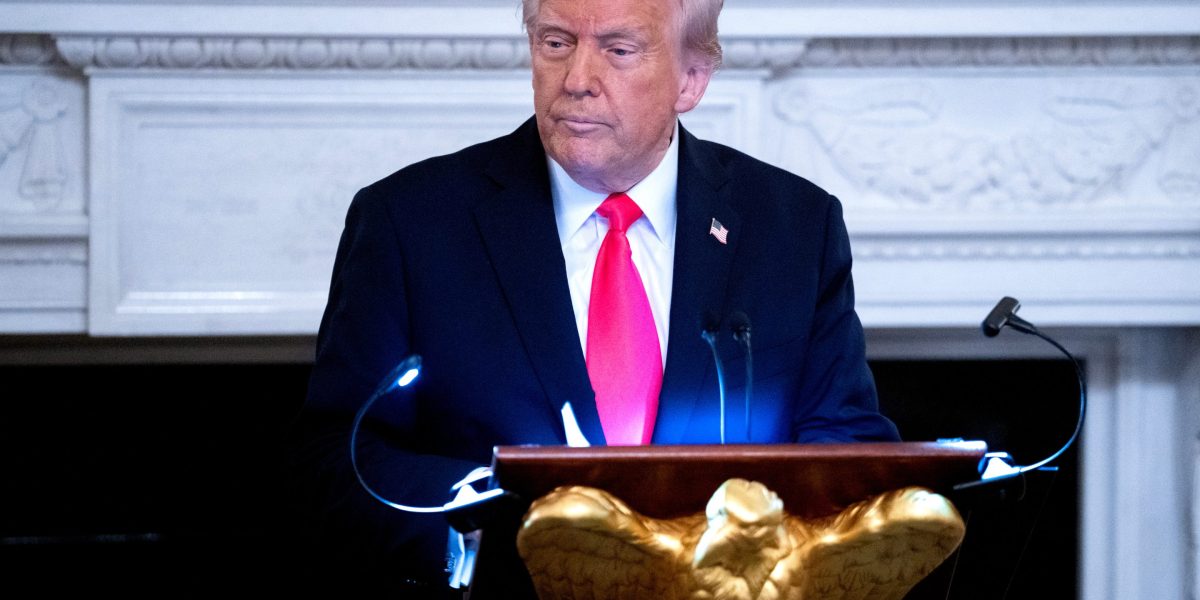In Russia, Vladimir Putin will throw protestors against the war in Ukraine in prison. The Chinese Communist Party will send dissidents to reeducation camps. It makes you thankful we live in the U.S.A., where we proudly celebrate our right to free speech, including the right to tell the government to go to hell. Right?
Except on March 9, the Trump administration arrested and briefly disappeared Mahmoud Khalil because they disapprove of his protests against Israel’s conduct of the war in Gaza. He was transferred to a remote, privately run Louisiana detention facility in the middle of the night and remains locked up. If you cut through the loose accusations, the White House justification for detaining and seeking to deport a green card holder, whose U.S. citizen wife is expecting their baby in a month, is that the administration disapproves of his views on Middle East politics.
And this case is no outlier. It was a canary in the coal mine of further attempted deportations. Rümeysa Öztürk, a PhD student at Tufts, was recently accosted and taken off the street by armed, masked, unnamed men. Her transgression was apparently co-authoring an op-ed in the student newspaper the previous year about the university’s handling of student protests.
Her attempted deportation is simply the latest example of the Trump administration taking a sledgehammer to free speech and using the federal government to enforce compliance with government-sanctioned views.
Lest we forget, the White House banned the Associated Press from the White House press pool in February for failing to use the president’s preferred language to describe the body of water south of Louisiana. And their colleagues at CBS, NBC, ABC, PBS and NPR—broadcasters that President Trump has attacked—have had the Federal Communications Commission announce investigations into them.
The attacks on free speech started on President Trump’s very first day in office. Among other things, Trump ordered that retired four-star General Mark Milley be stripped of his security detail—which was in place due to threats to his life from a foreign government—along with his portrait and potentially a star, after Milley called Trump unfit for office. General Milley gave 43 years of his life to service of his country in the U.S. Army, rising to Chairman of the Joint Chiefs of Staff. This decision was not predicated on an assessment of the security risks Milley faced. It was punishment for Milley’s political views.
Soon after, the Trump administration stripped security clearances from the lawyers for former special counsel Jack Smith. Trump has issued executive orders intending to hobble the ability of two major law firms to do business, based on the clients they have chosen to represent in the past.
Let’s be very clear: The First Amendment prevents the government from restricting our speech because they don’t like what we’re saying. And because of this, the administration should lose a lot in court as these actions are challenged, as they have frequently lost so far.
But prevailing in any given assault on political opponents is not the Trump admin’s objective. The point of these attacks is to show that if you oppose Trump and his goals, the government will try to destroy you. The government doesn’t have to prevail in court to land a devastating blow on the people and organizations it targets for their speech or political positions. Workers can lose jobs, businesses can lose clients, universities can see federal grants frozen, legal fees can stack up, and people can be hauled out of their homes away from their families by anonymous armed officers without cause or explanation. Prevailing later in court doesn’t soften the blow of those experiences.
Make no mistake: The targets of these actions are not only Mahmoud Khalil and Mark Milley and some big law firms and the Associated Press. We are all the targets.
The point of targeting the Trump admin’s opponents is to show everyone else that the pragmatic course is to keep our heads down. It’s to coerce cooperation, enforce silence, and suppress opposition. We can win court battles and yet lose the war for our freedoms if people and organizations feel compelled to stay silent, change their behaviors, and self-censor because the risk of doing otherwise is too high.
It’s already happening. Even before Jan. 20, corporate America was bending over backwards to get on the president-elect’s good side. As Trump has said, “The first term everybody was fighting me. This term everybody wants to be my friend.” Meta paid $25 million to Trump’s presidential library fund to settle a lawsuit widely considered to be frivolous. Universities are canceling programs and scrubbing websites. Pro bono litigators are reporting hesitation from large law firms to join cases against the government for fear of drawing presidential ire. A senior staff person at a major civil rights nonprofit told me their board was questioning strategy for fear of drawing administration attacks.
That’s why, as crucial and heroic as the actions are of those who win legal victories against a lawbreaking administration, defending the First Amendment cannot be left to lawyers in the courtroom. Saving our right to speak freely and organize around our beliefs, even when the current administration may not like it, is a responsibility we all share.
We can disagree with each other in the political arena and even despise the positions others take, but we have to stand up for each other’s First Amendment rights because if the government gets to censor others, they can censor us too. That’s why we—especially United States citizens who don’t face nearly the same newfound dangers as visa or green card holders—need to demand that business leaders, university presidents, heads of organizations, and elected officials push back when the government is weaponized against the exercise of First Amendment rights. If we don’t, we’re all next in line.
The First Amendment is the bulwark of our freedom. There is no place for one man to tell us what we can or can’t say. That’s what this country was built on, and it’s worth fighting for.
The opinions expressed in Fortune.com commentary pieces are solely the views of their authors and do not necessarily reflect the opinions and beliefs of Fortune.
Read more:
This story was originally featured on Fortune.com
Source link

 Entertainment8 years ago
Entertainment8 years ago
 Politics8 years ago
Politics8 years ago
 Entertainment8 years ago
Entertainment8 years ago
 Entertainment8 years ago
Entertainment8 years ago
 Tech8 years ago
Tech8 years ago
 Tech8 years ago
Tech8 years ago
 Tech8 years ago
Tech8 years ago
 Politics8 years ago
Politics8 years ago







